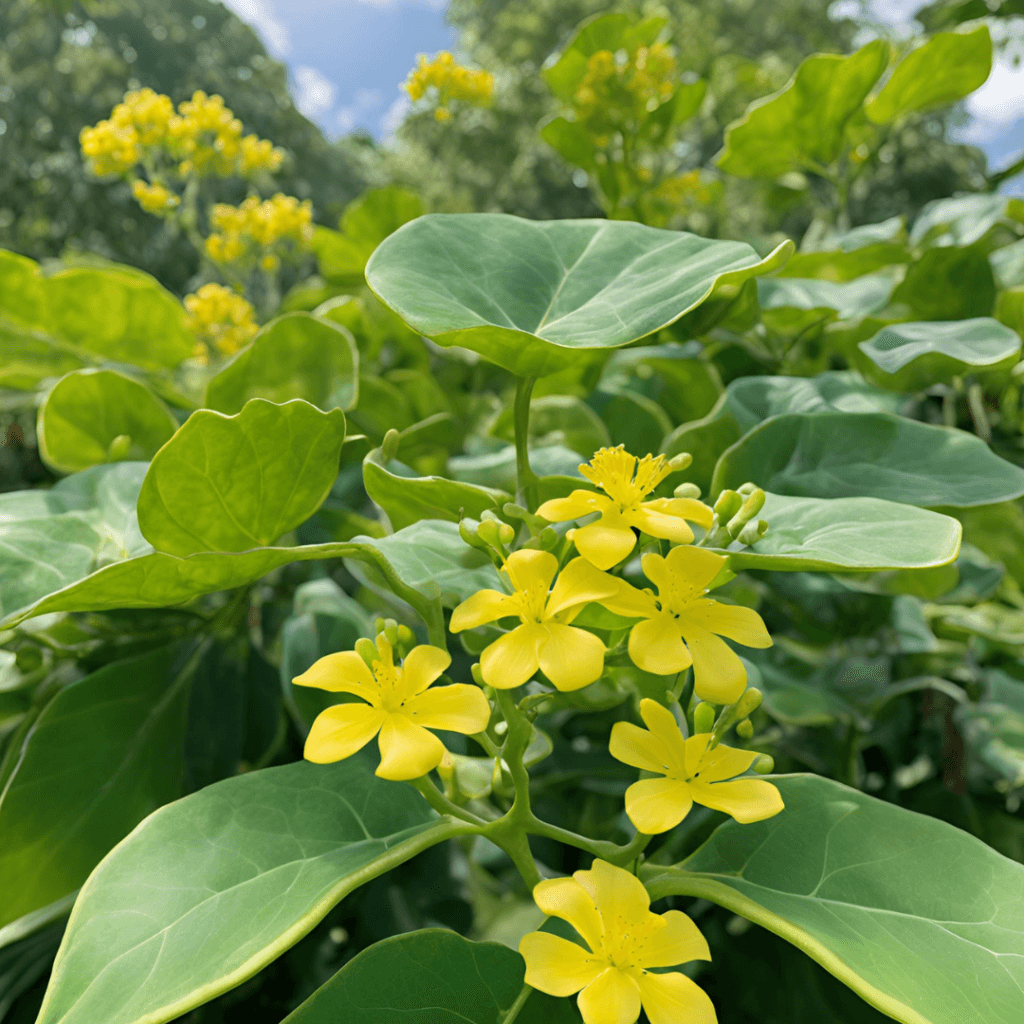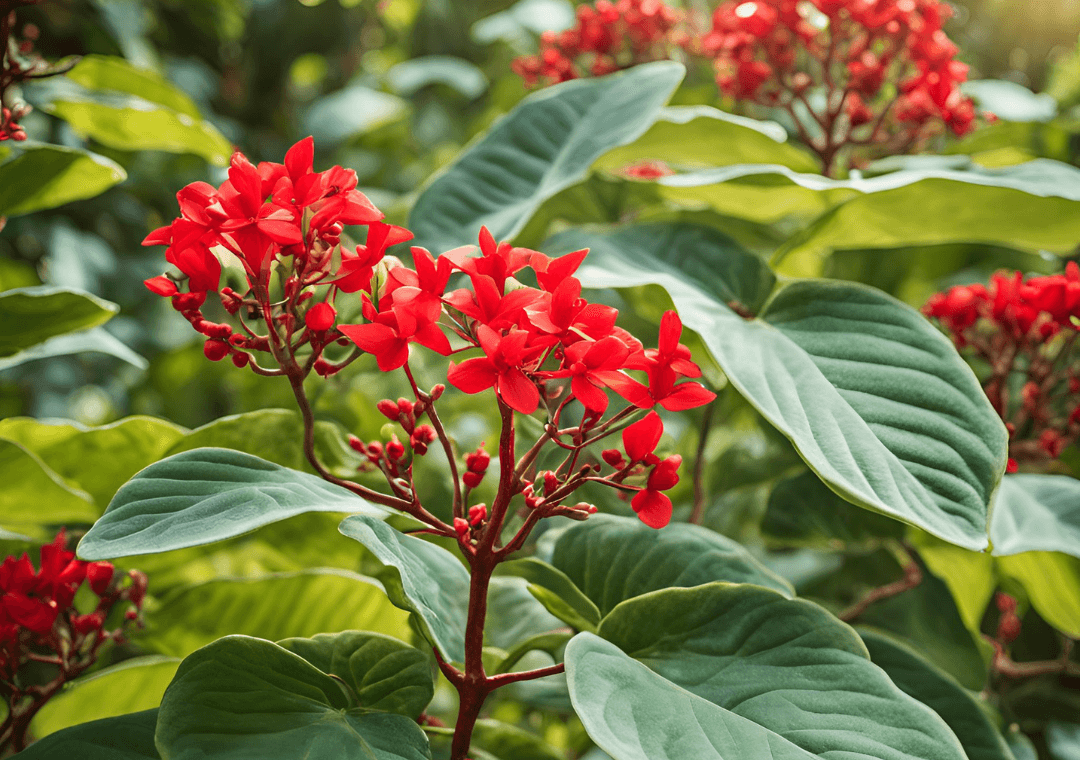Jatropha, or Barbados nut is a plant native to Central America but found throughout the world in tropical and subtropical regions. While it is most often known for its oil-producing seeds, which are used in biodiesel production and traditional medicine, jatropha has a great spiritual significance among many cultures. This plant is reputed to have potent qualities that confer to individuals and communities protection, healing and strength, and as a result, it is a respected plant in spiritual as well as practical practices.
In this article, we will discover the spiritual benefits of Jatropha, its historical background, and how it has been utilized for hundreds of years to bring balance, healing and spiritual protection.
Spiritual Significance Across Cultures
Jatropha has been used for its practical benefits but also for its spiritual power for a long time.In fact, it has been recognized for potent energy by the indigenous peoples of the Americas, Africa and Asia, which they have included in their religious and cultural rituals. However, Jatropha is a sacred plant in many traditional belief systems and, at times, connected with protection, prosperity and divine connection.
In West Africa, for example, Jatropha is believed to protect people from evil spirits and to protect people. They plant it near homes, villages, or sacred spaces in order to create a barrier against negative energy in these cultures. Some believe it serves a spiritual purpose, as a spiritual shield which absorbs noxious forces and repels them from the defended area.
Moreover, Jatropha is used in some parts of India in ceremonies to call upon the divine to bless, protect and heal. In rituals involving the spiritual guidance of higher places of consciousness, the leaves and roots of the plant are used. As a matter of fact, a variety of spiritual healers believe that Jatropha is an effective plant for clearing away stagnant energy and bringing mental and spiritual clarity.

READ ALSO: The Spiritual Benefits of Sorrel: A Sacred Flower for Mind, Body, and Spirit.
Protection and Spiritual Shielding
Protection is one of the most important spiritual benefits of Jatropha. It has long been used to make protective barriers—physical or spiritual. The plant’s strong, thorny nature is a symbol of a plant that acts as a guard against the negative forces and spirits, so it’s a popular plant to use in protection rituals.
Jatropha is used in many African traditions for spiritual practice to protect people from harm, particularly during times of weakness (illness) or spiritual challenge. It is thought that the plant soaks up and reflects any negative energies, protecting the individual or space from any wicked energies.
As a matter of fact, it is also used in rituals to ward off envy, jealousy or curses. This is believed to be a spiritual protector, keeping these bad energies away and the person away from any evil intention. Some traditions believe that Jatropha seeds can be carried on the person as a talisman for protection or placed around the home in order to set a safe and peaceful environment.
Spiritual Healing and Emotional Restoration

Secondly, Jatropha is also used in emotional and spiritual healing. In some cultures, the plant is believed to heal emotional wounds and bring clarity to the mind. Emotional resilience is thought to be offered by the strength of the Jatropha plant, which will help one to heal from past trauma, anxiety or depression.
In spiritual healing rituals, Jatropha is usually used to make herbal teas or infusions (if the leaves are used) or is taken in baths meant to cleanse the body and spirit. It is thought that practicing these techniques can help to release emotional blockages leading to peace and inner harmony. There are those who think that the plant’s energy aids people in getting back on emotional balance after having difficulties or emotional stress.
The concept of renewal and growth is also connected with Jatropha’s spiritual healing power. The idea is that just as the plant can grow and thrive in conditions that many find a challenge, it can aid those that face similar struggles in moving through to bigger, better and stronger things. Jatropha promotes healing and brings the individual back into balance spiritually, emotionally and mentally.
Improving Prosperity & Abundance
The plant is also believed to bring prosperity and abundance, in addition to its protective and healing qualities. Some cultures have seen the plant as a symbol of wealth, growth, and good fortune. It is a common plant to use in rituals that attract prosperity and success because of its connection to growth and vitality.
Jatropha is sometimes used in rituals for those wanting to manifest wealth or fortune or seeking more opportunity in life. It is believed the plant will strengthen and vitalize the person, help draw in the positive energy, open doors to the new opportunities, and manifest your wishes. In some spiritual practices, the seeds are used as offerings to bring blessings of money or to bless business.
In parts of Africa, Jatropha is planted around houses and businesses in order to attract good fortune and keep the household or business protected and prosperous. It’s viewed as a good luck charm and can bring a steady flow of good energy that leads to success and well-being.
READ ALSO: The Spiritual Benefits of African Nutmeg: A Sacred Gift from Nature
Ancestor and Divine Forces Connection
For connecting with ancestors and getting spiritual help, people in Africa and in the Caribbean think of the plant as an important medium. As a matter of fact, Jatropha is thought to give you the energy to communicate with the spirit world and gain messages from, blessings from, or protection from your ancestors or guardian spirits. It’s leaves or seeds are offered in some rituals to honour ancestors and to call on their blessings. Moreover, spiritual practitioners connect with the plant in order to ally themselves with the wisdom and strength of their ancestors that ensure the path is protected and guided.
Furthermore, Jatropha is a part of one of the divination practices in some cultures. It is believed that the plant’s energy opens your mind to higher spiritual knowledge and gives you insights that make it possible for you to make decisions and take actions.
Clarity and Insight

For those meditating, this plant can be quite a nice and useful tool to have in order to heighten mental clarity and access more spiritual insight. It is believed that its purifying and protective qualities make it a space for focused, clear spiritual practice. It is thought that the plant helps people concentrate and free themselves of distracting thoughts, enabling them to enter more profound meditation and understand religious concepts more profoundly.
Jatropha has been known to be used in meditation, and it is supposed to connect our inner selves deeper and aid us in contacting higher spiritual beings. Because of its ability to clear negative energy and bring about emotional balance, it is an ideal companion for anyone looking to strengthen their spiritual practice and obtain greater clarity.
Jatropha can also help people get rid of mental fog or confusion. It is believed to possess strong, vibrant energy that states it stimulates mental focus so people stay present and aware while performing meditation, prayer, or any other spiritual exercise.
READ ALSO: LOST BOOK OF HERBAL REMEDIES
Conclusion
Jatropha curcas, or Jatropha, is more than just a hardy plant that has many practical uses; it is a tool of spiritual protection, healing and transformation. As a matter of fact, this plant is well known in many cultures for its protective and healing properties that can ward off negative energy, promote emotional healing and attract abundance and prosperity.
In fact, it has a very unique energy and can be used for rituals, meditation, or as a spiritual protector, but whether used in this manner or not, it can help you to tap into your own inner strength, heal from emotional wounds, and manifest your desires.
Incorporating Jatropha into your spiritual practices will help you to create a space of protection, healing and growth.
